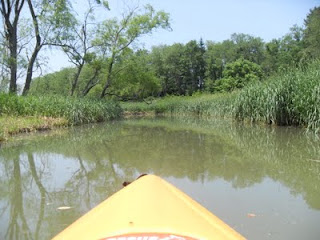
It used to be a covered bridge. And there's only ever been one reason to cover a bridge: in order to protect the structure from the elements. But Washington County will do whatever it takes to make the gas companies happy, and the Marcellus shale frackers couldn't fit their beastly trucks over the covered bridge, so off came the roof. You can't afford to wax sentimental about "local color" or "regional identity" when Range Resources comes calling.
The result of uncovering the bridge is going to be twofold. First, the structure will rot and collapse because it wasn't built like modern bridges, which don't require roofs. Second, we're one covered bridge the poorer in the Commonwealth. Ah, but these problems aren't yours and mine. We'll allow another generation to sort out the mess.

This is the back way to "put-in" a kayak or canoe at Cross Creek Lake, in Washington County. Going west on PA50, at the village of Woodrow, take a left onto Old Ridge Road and follow it to a sharp leftward turn with a little park road to the right. The park road leads to this once-covered bridge. If you're going paddling, this is so much nicer than the main entrance to the park. It was the Sunday of Memorial Day weekend, but I had the whole place to myself.
On the far side of the uncovered bridge, the road becomes a clay-dirt track the likes of which I haven't seen since my Africa years. It snakes through forest and uphill. Eventually, the little lane remains under deep canopy as the countryside off to the the left opens up dramatically beneath it. The road feels like a mezzanine in darkness, looking out over a vast auditorium, the ancient farmlands and the woodlots of southern Pennsylvania. It gave me the impression of standing in a high, dark balcony that overlooks a large, bright theater or sanctuary.

The tragedy of this place tears at my heart. The weary old countryside first settled in the last decades of the 18th century has seen so much heartache and bloodshed. It's been a place of accute injustice, where the rich in far-off cities have exploited the local poor shamelessly, and at least in recent years, the poor have been complicit in their own dehumanization. This land has been mined, and strip-mined, and farmed, and drilled, and in all of these ventures, poisoned. And yet, her quiet dignity and forlorn beauty are still her own.
The little road is topped with gravel as it reaches the summit, a broad, flat area. As the road draws near to a loud, heinously ugly fracker station, you'll see threatening signs warning that the place is off limits to all except hardhatted employees of Range Resources.
 Cross Creek is not an altogether unpleasant place to spend a Sunday afternoon in a kayak. It's especially nice if you take the back entrance and paddle about a quarter mile down the little estuary that leads from the parking area to the lake. This little stream is deep and swampy, overgrown with reeds. It's strangely reminiscent of a Louisana swamp.
Cross Creek is not an altogether unpleasant place to spend a Sunday afternoon in a kayak. It's especially nice if you take the back entrance and paddle about a quarter mile down the little estuary that leads from the parking area to the lake. This little stream is deep and swampy, overgrown with reeds. It's strangely reminiscent of a Louisana swamp.







